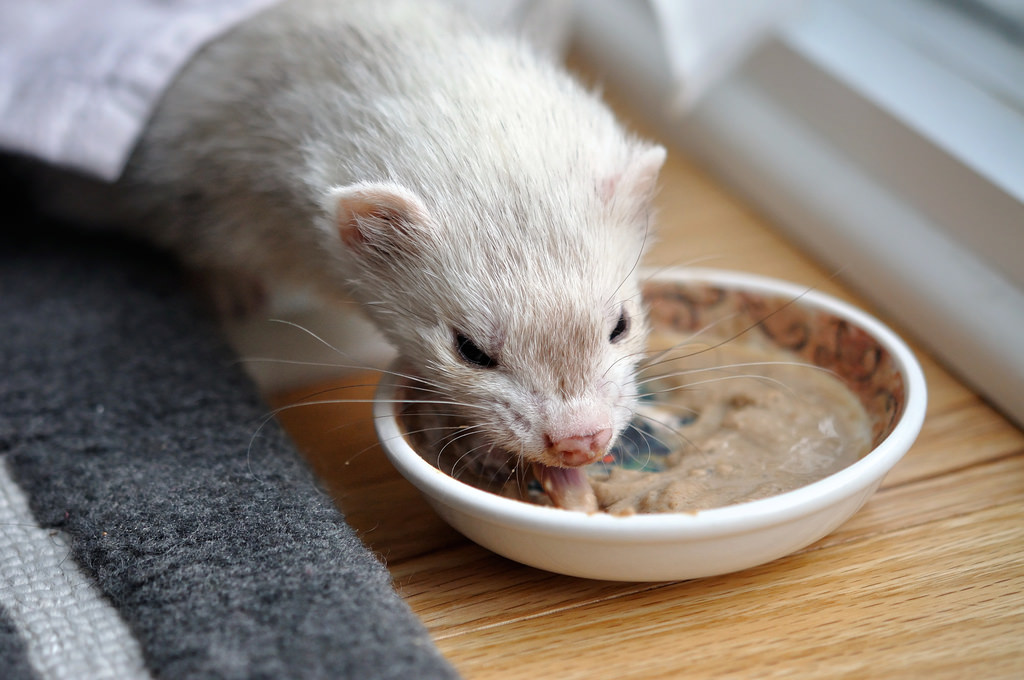As an affiliate, I may earn from qualifying purchases.
Insulinoma is a common and challenging health issue in ferrets. It’s a condition where tumors develop in the pancreas, causing overproduction of insulin and leading to low blood sugar levels (hypoglycemia). Managing a ferret with insulinoma requires special attention to their diet, as nutrition plays a crucial role in their overall well-being. In this guide, we’ll explore the dietary considerations and feeding strategies for ferrets with insulinoma.
1. Frequent, Small Meals:
- Ferrets with insulinoma should be fed multiple small meals throughout the day to maintain stable blood sugar levels.
- Aim for at least 4-6 meals spaced evenly to prevent dips in glucose.
2. High-Quality Protein:
- Protein is the primary energy source for ferrets, and it’s essential for maintaining their muscle mass and overall health.
- Choose high-quality protein sources like meat-based ferret food or fresh, cooked meats such as chicken or turkey.
3. Limited Carbohydrates:
- Minimize the intake of carbohydrates in your ferret’s diet. Carbohydrates can cause spikes in insulin production, worsening the condition.
- Opt for carbohydrate-free ferret food or cat food that contains minimal grains or fillers.
4. Specialized Ferret Food:
- Some commercial ferret foods are designed for insulinoma-prone ferrets, with lower carbohydrate content.
- These formulas can be a convenient option, but always check the ingredient list for quality.
5. Fresh Foods:
- Fresh, whole foods can be beneficial. Offer small amounts of cooked, lean meats, but avoid adding sugars, sauces, or seasonings.
- You can also provide cooked egg yolks or organ meats as occasional treats.
6. Monitor Sugar Levels:
- Regularly monitor your ferret’s blood sugar levels with the guidance of your veterinarian.
- Adjust their diet and medication as needed based on these levels.
7. Nutritional Supplements:
- Consult your veterinarian about adding supplements like fish oil or vitamin E to support your ferret’s health.
8. Avoid Sugary Treats:
- Avoid sugary treats, fruits, and any foods high in sugar content, as they can lead to dangerous blood sugar fluctuations.
9. Consult Your Veterinarian:
- Always work closely with your veterinarian to develop a personalized feeding plan for your insulinoma-affected ferret.
- Your vet may prescribe medications like prednisone or diazoxide to help manage the condition.
10. Water Availability:
- Ensure your ferret has access to fresh, clean water at all times. Dehydration can exacerbate insulinoma symptoms.
11. Weight Management:
- Maintain a healthy weight for your ferret. Obesity can worsen insulinoma, so consult your veterinarian for guidance on portion control.
12. Regular Check-Ups:
- Schedule regular check-ups with your vet to monitor your ferret’s condition and adjust their diet and medications as needed.
In summary, managing a ferret with insulinoma requires a careful and specialized approach to their diet. Focus on high-quality protein, limited carbohydrates, and frequent, small meals to help maintain stable blood sugar levels. Always consult your veterinarian for guidance and adjustments to your ferret’s feeding plan. With proper care and attention, you can enhance the quality of life for your insulinoma-affected ferret.




